August 25, 2015
Kris Griffin
info
ariad, cancer drugs fund, chronic myeloid leukaemia, Iclusig, National Cancer Research Institute CML Working Group, National Institute for Health and Care Excellence, nhs, ponatinib, T315i mutation
A quick update, excellent article from the Pharma Times. Kris
Medical experts are slamming a decision by NHS cost regulators that restricts use of Ariad’s Iclusig in the treatment of chronic myeloid leukaemia in England while patients in Scotland and Wales get full access to the novel drug.
Iclusig (ponatinib) was cleared in Europe in 2013 as an orphan drug considered to offer a significant benefit to patients. However, it was not appraised by the National Institute for Health and Care Excellence because of its small target population, leaving the decision on access with the Cancer Drugs Fund, which says it can only be given to patients with the rare T315I mutation, representing about 2%-20% of CML patients.
Results of a poll by the National Cancer Research Institute CML Working Group revealed that 83% of respondents support a change in CDF policy so that Iclusig is available to all appropriate patients in England in line with its approved indication, as the current disparity in access and use of treatments is failing patients.
“The CDF uses a different methodology to score therapies; by assessing the Median Total Drug Cost per Patient this effectively penalises therapies that help patients live longer,” said Mark Tanner, General Manager of ARIAD Pharma UK. “Given recent news about the restructuring of the CDF & NICE, we hope that NHS England will address this anomaly and quickly find a mechanism to allow patients in urgent need the same level of access as their neighbours in Scotland and Wales,” he added.
“Treatments should be available on an equal basis to all people with chronic phase CML across the UK; the decision should be medical, not geographical,” added Prof Mhairi Copland, Chair of NCRI CML Working Group and Professor of Translational Haematology, University of Glasgow, while Dragana Milojkovic, Department of Haematology, Imperial College School of Medicine Hammersmith Hospital, London, noted that “restricted use of therapies imposed by the CDF have seriously limited our ability to treat patients effectively, which is a barrier especially when treatments are used according to their full license elsewhere”.
by SELINA MCKEE
Read the original article here: www.pharmatimes.com/Article/15-08-25/Experts_call_for_equal_access_to_CML_therapies_in_the_UK.aspx#ixzz3jqZxTTre
52.388596
-2.249684
September 29, 2013
Kris Griffin
info
blood cancer, cancer, cancer drugs, cancer drugs fund, cancer patients, cdf, chronic myelogenous leukemia, chronic myeloid leukaemia, cml, cml patients, dasatinib, drugs, health, medicine, national health service, National Institute for Health and Care Excellence, nhs, nhs budget, nice, politics, value based pricing
Whilst I applaud and welcome the news that the Cancer Drugs Fund (CDF) has been extended until 2016 with a budget of £200m a year it’s important we don’t see this as a win and look for the next battle. It is likely that this ‘new’ £400m has been top-sliced from the NHS budget in a similar fashion to original CDF thereby creating a problem at another level.
Let’s also not forget that the CDF was established in order to provide a means by which National Health Service (NHS) patients in England can get cancer drugs that are not routinely available on the NHS. This includes drugs like dasatinib (treatment for CML – Chronic Myeloid Leukaemia) that effectively saves lives (like mine) but for some misguided reason are rejected by NICE (National Institute for Health and Care Excellence). The new value based pricing (VBP) system that we were expecting next year appears to have been swept under the carpet, presumably because when the government did the sums it was going to cost them more than £400m. So our new £400m is a stay-of-execution. Get the next election out-of-the-way, note that this 2 year extension ties very nicely into the coalition term, and make an unpopular decision at the beginning of the next term if the election is won. In the meantime the Conservative party can bang their drums over the next few days at the party conference to the tune of being saviours of cancer patients everywhere. Not sure how people who are suffering with other illnesses are going to feel about that one.
Even I’m astounded by the level of my own cynicism but in this case I feel it is well founded. The complete and utter failure of VBP to even emerge from the starting blocks and the countdown to the end of the CDF left the coalition with no alternative.
Patients deserve the best treatment. We should not be held hostage by pharmaceutical companies or be pawns in politics. Much of the problem lies with NICE, their flawed processes and their reliance on limited information about the clinical effects of new products supplied to it by the pharmaceutical industry. There is much to unpick. In the short-term we’ll save lives and I can’t be angry about that but in the long-term the system will still be in a mess. What we’ve been presented isn’t a solution, it is another finger in the dam and I’m losing count of the number of holes.
Kris Griffin
BBC NEWS: Cancer drugs fund ‘to be extended’ until 2016
SKY NEWS: NHS’ Life-Extending Cancer Drug Fund Extended
The Guardian: Cash injection to keep cancer drugs fund running for two more years
June 17, 2013
Kris Griffin
info
acute lymphoblastic leukaemia, ALL, babies, blood cancer patients, cancer, chemotherapy, chronic myeloid leukaemia, clinical nurse specialist, clinical psychologist, cml, cml patients, conference, dasatinib, Doctor Richard Taylor, drugs, facebook, fertility, health, imatinib, Institute of Cancer Research, Leukaemia Care Patient and Carer Conference, medicine, National Health Action Party, nhs, politics, public speaking, science, sperm banking, treatment, worcester
Yesterday was the Leukaemia Care Patient and Carer Conference held at Worcester Rugby Club. Anyone who reads this blog will know how fond I am of Leukaemia Care and the event was tackled with the usual friendly, welcoming attitude we’ve come to expect from the family. Doctor Richard Taylor, independent member of Parliament for Wyre Forest between 2001 and 2010 and co-Leader of National Health Action Party, facilitated the day. As President of Leukaemia Care he was the perfect choice to ensure the day ran to time and bring order to discussions.
The day started with a presentation on ALL (acute lymphoblastic leukaemia) from Monica Else, a senior scientific officer from the Institute of Cancer Research. Monica’s husband, a patient,also attended and they provided a fantastic insight into how the science translates into real life. This was followed by the inspiring Lisa Nelson who, although enduring two transplants, brought optimism and courage to the stage. Tuney Thomas, a clinical nurse specialist from Worcestershire Royal Hospital spoke about chemotherapy and cut through the science and rumour with panache. Deborah Alsina, CEO of Bowel Cancer UK, spoke from a carer’s perspective as her husband has leukaemia. Their story of imatinib, dasatinib and babies struck a chord with me and it has been a long while since I have been captured by a speaker so much. I’m not sure anyone in the room wanted her to stop.
After a very tasty lunch break with the opportunity to catch up with old friends and new, we headed into breakout sessions on clinical trials and benefit advice. John Donohue, a charted clinical psychologist from Russells Hall Hospital, spoke in-depth about the psychological and emotional experiences of blood cancer patients. This was a difficult one, a very divisive subject and John handled questions and wide-ranging topics carefully and with care.
Then it was my turn. I thoroughly enjoy spending time, talking and sharing my experiences with an audience, it’s a very liberating and cathartic thing for me. This was also the first time, against advice, I spoke about sperm banking and fertility treatment. Without it I wouldn’t be a Dad; it is so important for the cancer patient. I’d like to think the delegates felt comfortable, well they laughed in all the right places, although I’m not sure they’ll ever hear a bell ringing the same way again. The day finished with a panel discussion, which I was part of. Lots of questioning and a fascinating discussion about the part Facebook plays in the care network. My good friend Nigel Deekes was in attendance and delivered some impromptu and informative words about the subject.
What struck me from the day was that Leukaemia Care really do care, they are a fantastic national charity who have great potential to make lives better. Controversially, perhaps, I did challenge them to bring more young people into the fold. I don’t think there was a delegate under the age of 25. Without young people, who are sadly the next generation of patients, I fear for any charity. The challenge was accepted with eager vigour as I expected. I can’t wait for the next conference.
I left brimming with new ideas, watch this space, and inspired by stories of courage and care. The Leukaemia Care team deserve a huge pat on the back for delivering a fantastic event and if anyone can tell me a better way to spend a Saturday I’d like to hear it.
www.leaukaemiacare.org.uk
-
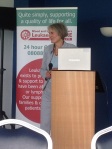
-
Monica Else
-
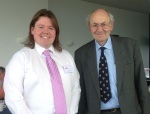
-
Kris Griffin and Doctor Richard Taylor
-
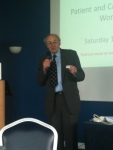
-
Doctor Richard Taylor
-
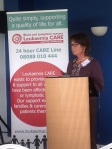
-
Lisa Nelson
June 5, 2013
Kris Griffin
info
blood cancer, cancer, cancer drug fund, chronic myeloid leukaemia, dasatinib, department of health, drugs, Hansard, healthcare, imatinib, leukaemia, Mark Garnier MP, National Institute for Health and Care Excellence (NICE), nhs, nilotinib, Norman Lamb, parliament, patient, politics, research, Secretary of State for Health, treatment, written questions
My thanks again go to Mark Garnier MP for asking these written questions for us in Parliament. It’s vitally important that we keep asking questions, forcing answers (even if we don’t like them) and giving this cause as high a profile as we can manage. These answers are recorded for posterity in Hansard and we can refer back to them any time. Hansard is the name of the printed transcripts of parliamentary debates in the Westminster system of government. It is named after Thomas Curson Hansard, an early printer and publisher of these transcripts.
Kris
22 Apr 2013 : Column 753W
Leukaemia
Mark Garnier: To ask the Secretary of State for Health (1) what steps he has taken to ensure that those diagnosed with chronic myeloid leukaemia have access to a wide range of treatment options, including Dasatinib’ [151773]
(2) what recent discussions he has had to ensure that those diagnosed with chronic myeloid leukaemia have access to a wide range of treatment options, including Dasatinib. [151774]
Norman Lamb: The Mandate to NHS England clearly states the need to improve access to treatment for people when they need it.
The National Institute for Health and Care Excellence (NICE) has issued technology appraisal guidance that recommends the drugs imatinib and nilotinib for use in the treatment of chronic myeloid leukaemia. NICE guidance does not recommend dasatinib as a clinically and cost-effective use of national health service resources.
Commissioners are under a statutory obligation to provide funding for such treatments and drugs recommended by NICE within three months of the guidance being published.
Patients have a right under the NHS Constitution to clinically appropriate drugs and treatments recommended by NICE technology appraisal guidance.
Since October 2010, the £650 million Cancer Drugs Fund has helped over 28,000 patients in England to access the drugs their clinicians believe will help them. NHS England has now taken on oversight of the fund, bringing even greater consistency to decision making.
The Secretary of State for Health, the right hon. Member for South West Surrey (Mr Hunt), has had no recent discussions about this matter.
http://www.publications.parliament.uk/pa/cm201213/cmhansrd/cm130422/text/130422w0007.htm#13042383001683
22 Apr 2013 : Column 735W
Cancer: Drugs
Mark Garnier: To ask the Secretary of State for Health with reference to the Cancer Drugs Fund, as announced by the NHS Commissioning Board, whether access to some treatments previously available through the fund will be restricted. [151790]
Norman Lamb: Since NHS England took on oversight of the Cancer Drugs Fund from 1 April 2013, it has published a national list of cancer drugs covered by cohort policies on its website at:
www.england.nhs.uk/wp-content/uploads/2013/03/ncdf-list.pdf
We understand that the great majority of cancer drugs previously funded by strategic health authority panels are on this cohort policy list, supporting timely and consistent access. Clinicians can apply to the national Cancer Drugs Fund for the inclusion of a drug within the approved cohort list.
Regional clinical panels will continue to consider individual patient applications where a patient is considered to be exceptional to a cohort, policy or where use under a cohort policy has not been considered due to the rarity of the condition.
http://www.publications.parliament.uk/pa/cm201213/cmhansrd/cm130422/text/130422w0006.htm#13042383001615
May 10, 2013
Kris Griffin
info
accesscmldrugs, blood cancer, cancer drug fund, chronic myeloid leukaemia, cml, cml patients, complete molecular remission, current-events, dasatinib, health, imatinib, kris griffin, labour party, leukemia, major molecular remission, medicine, nhs, nice, nilotinib, politics, remission, research, science, stop trials, TKIs, tom watson mp, treatment, tyrosine kinase inhibitor, tyrosine kinase inhibitors, west bromwich
I’m still trying to get my head around today! It may just be the most amazing thing to happen to the AccessCMLDrugs campaign to date. Tom Watson who is the Member of Parliament for West Bromwich East, Deputy Chair of the Labour Party and the Labour Party’s Campaign Co-ordinator has agreed to support our cause!
We met this afternoon in West Bromwich and spent some time going over the issues affecting CML patients, namely the unavailability of dasatinib. We discussed, in detail, the STOP trial data, the effectiveness of dasatinib, what the TKI (tyrosine kinase inhibitor) drugs mean to CML patients, survival rates and the cancer drug fund. I told him about our campaign so far and how hard it is get our voice heard, especially by NICE, the pharmaceuticals and his own party. He agreed that it is important to ensure that all CML drugs are available to patients, free at the point of delivery. He has told me that he will do all he can to support us, he looked me in the eye and he told me that he believed in what we are trying to do.
To say I was blown away is an understatement. Tom is one of the most powerful men in politics today and I’d gone prepared; I’d even taken my box of dasatinib to show him what this is all about. He was sharp, working out quickly how much the NHS could save if the STOP trials findings are conclusive and adopted in England. These being the ongoing trials where 40% of patients who achieve CMR (Complete Molecular Remission) over a period of time come off their drugs and don’t need them again. The other 60% take the drugs again and the leukaemia goes back into remission. Hopefully you never tire of me writing about this as a cure for cancer.
So that’s it in a nutshell. Tom wants me to put a report together and propose how I want him to help out. He was sincere, friendly and genuinely interested in leukaemia and blood cancer patients. I sat in my car for 20 minutes afterwards just taking everything in, it was emotional. The implication on what we are trying to achieve is huge and having someone like Tom behind us is simply fantastic (sadly that doesn’t feel like a big enough word).
I need to start gathering research and writing up that report but in the meantime I’m sure you will join me in thanking Tom for taking an interest in a handful of poorly people and their little fight to stop a big disease. Thank you.
Kris

Tom Watson, Member of Parliament (MP) for West Bromwich East, Deputy Chair of the Labour Party and the Labour Party’s Campaign Co-ordinator, with CML campaigner and patient Kris Griffin
April 9, 2013
Kris Griffin
action
blood cancer, cancer, care conference, charity, cml, health, leukaemia care, leukemia, medicine, nhs, Patient and Carer Conference, patient support groups, patients, research, science, treatment, worcester
Leukaemia Care are now taking bookings for the next Patient and Carer Conference in Worcester! Visit the website for more info, and to download the booking form:
http://www.leukaemiacare.org.uk/care_support/patient_carer_conferences
15th June 2013 – Worcester (Sixways Stadium) – Patient and Carer Conference
I’ll be talking at this event so hopefully see you there.
Kris
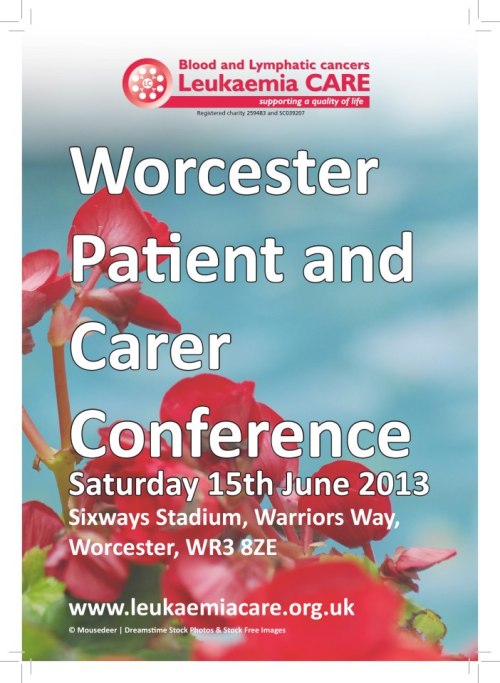
Leukaemia Care Conference
April 5, 2013
Kris Griffin
info
cancer drug fund, cdf, chronic myeloid leukaemia, cml, cml patients, dasatinib, drugs, government, health, health policy review, House of Commons, imatinib, labour, medicine, nhs, nice, nilotinib, patient, politics, Rt Hon Andy Burnham MP, Shadow Secretary of State for Health, treatment
Further to the media attention we received yesterday in trying to get some answers on the Cancer Drug Fund and the future funding for dasatinib I’m sending the Shadow Secretary of State for Heath, Andy Burnham another letter. I didn’t receive an answer to my February correspondence with him. K.
Rt Hon Andy Burnham MP
Shadow Secretary of State for Health
House of Commons
London SW1A 0AA
5th April 2013
Dear Mr Burnham,
My name is Kris Griffin and I am the founder of the Access CML Drugs Blog, which campaigns to improve patient access to treatments for Chronic Myeloid Leukaemia (CML). I wrote to you about the issues facing CML patients in early February, however I have not yet received a response. You may remember that we briefly discussed this issue at the Britain Against Cancer conference back in December and I would welcome the opportunity to have an exchange of views about the availability of treatment for the disease and current access to medicines arrangements.
You will be aware that the future of the Cancer Drugs Fund is an issue that has received significant media attention this week. A number of patient groups have raised concerns that when the fund ends in April 2014, patient access to medicines will be severely restricted. This is certainly true for CML patients as the only NICE approved drugs available are imatinib and nilotinib. However for a number of patients, including myself, these two treatments are not effective.
There are now fewer drugs available for the treatment of CML than when I was diagnosed five years ago. Due to the vagaries of the NICE appraisal process, the drug that has kept me alive, dasatinib, is no longer available via the NHS. In the majority of cases, access through the Cancer Drugs Fund is the only way that patients can receive life-saving treatments such as dasatinib.
Whilst I understand that you do not support the continuation of the Cancer Drugs Fund, I would be keen to hear your views on how patient access to treatments could be improved. Particularly, I would be interested to hear how this issue sits within Labour’s recently announced health policy review. Similarly, I was also interested to hear your recent policy announcement on the future of the NHS and the prospect of “whole person care”. While I hope that your plans to change local commissioning of services can lead to less geographical variation in the treatment of rarer cancers, I would be very keen to hear your views on how access to medicines arrangements would operate under this system. I would be more than happy to work with you on this issue and help ensure that patients are able to have access to the widest range of cancer treatments.
The situation I have described is not unique to CML and many people suffering from rarer cancers will experience the same trouble accessing potentially life-saving medicines. That is why access to medicines programmes such as the Cancer Drugs Fund are so important. I would be delighted to discuss the issue of Chronic Myeloid Leukaemia and access to medicines with you further at a later date.
Kind regards,
Kris Griffin
Access to CML Drugs
April 4, 2013
Kris Griffin
info
APPG on Cancer, bbc, cancer, cancer drug fund, cdf, cml, cure, current-events, dasatinib, drugs, health, leukaemia, Mark Garnier MP, medicine, National Institute for Health and Care Excellence, nhs, nice, patients, politics, research, science, treatment
The Cancer Drug Fund (CDF) is big news today, it’s all over the news and as I type this I am waiting for my local BBC radio station to call for an interview. The problem is that
this story has been brewing for a long time now and as we approach the moment funding will run out in 2014 the panic has started to set in.
The £650 million fund has paid for treatment for over 28,000 patients nationally since 2010. This is money the Government has set aside to pay for cancer drugs that haven’t been
approved by NICE (National Institute for Health and Care Excellence) and aren’t available within the NHS in England. For some it brings quality of life, others it gives precious time and for many it is truly life-saving.
The drug that I take for my leukaemia is called dasatinib. I receive it through the NHS, free at the point of delivery, as I should. But recently, since a change in NICE guidelines, dasatinib is only available to patients who apply for it through the CDF. There are alternative treatments available but by restricting access we are restricting progress and potentially putting lives at risk. For patients who rely on the CDF for their medication this news will bring cause for concern and unnecessary worry on top of a cancer diagnosis. They don’t know how their drugs will be funded post-2014 and no-one is reassuring them.
When I managed to catch up with Shadow Secretary of State for Health Andy Burnham MP and Secretary of State for Health Jeremy Hunt MP before Christmas neither man was willing to commit to extending the funding for the CDF and nearly 4 months later we still don’t have an answer or an alternative. I have written to both men and am still waiting for a response.
I am getting support. My local MP Mark Garnier, as always, is being very helpful as is the All Party Political Group (APPG) on Cancer. I hope that today is the start of the real pressure. Laura Weir, head of policy and campaigns at the MS Society and chair of the Patients Involved in NICE group, concerns me with her view that other conditions needed to be considered too. I wonder if Laura is aware that dasatinib is currently considered a breakthrough treatment for MS (see link here) and without the CDF no one would receive it, no funding, no drugs, no progress, no cures. For once I believe that we really are all in this together.
There is no point in us all fighting over funding, this is healthcare and if it benefits the patient we must all get behind it. 1 in 3 of us will be affected by cancer at some point in our lives, I was 32 when I was diagnosed. Those numbers are too high for us to sit back and do nothing.
I implore the Department for Health to either extend the CDF or provide us with plans for a real alternative now.
www.news.sky.com/story/1073672/cancer-drugs-fund-patients-to-lose-out
www.bbc.co.uk/news/health-22013399

Cancer Drug Fund usage from October 2010 – October 2012
January 9, 2013
Kris Griffin
info
BMA, cancer, cml, dasatinib, first-line treatment of chronic myeloid leukaemia, health, leukaemia care, leukemia, medicine, meeting, nhs, NICE Technology Appraisal, nilotinib, patient access scheme, patients, rapid review, science, standard-dose imatinib, treatment, tyrosine kinase inhibitors
Okay. Let’s not get our hopes up TOO much but I’ve come across an agenda for the NICE Technology Appraisal Committee meeting on Tuesday 15 January 2013. Listed as point 6 on the agenda is:
6. Rapid review of TA251 – dasatinib, nilotinib and standard-dose imatinib for the first-line treatment of chronic myeloid leukaemia (part review of technology appraisal guidance 70)
This would indicate to me that something has changed, perhaps BMS have offered a Patient Access Scheme (discounted price) for dasatinib and that NICE are duty bound to review the guidance. This is NOT a formality but there is a chance that the guidance could change. It would be wonderful to think we all had a small part to play in this, but the big thanks has to go to Leukaemia Care and the group of charities who have supported and worked with them – their unwavering pressure has been vital…so far.
If I hear anything else then I will post here, but let’s keep the pressure up and keep our fingers crossed.
Original link here: http://www.nice.org.uk/newsroom/publicmeetings/TAC15January2013.jsp
Kris
December 7, 2012
Kris Griffin
info
Alastair McLellan, All Party Parliamentary Group on Cancer, Andy Burnham, APPGC, Breakthrough Breast Cancer, Britain Against Cancer Conference, Cancer Black Care, cancer research uk, chronic myeloid leukaemia, cml, Health & Social Care Act, Julietta Patnick, leukemia, Macmillan Cancer Support, Marie Curie Cancer Care, Men's Health Forum, MP, National Cancer Intelligence Network, National Cancer Research Institute, nhs, Professor Sir Mike Richards, Prostate Cancer UK, Rarer Cancers Foundation, science, Teenage Cancer Trust, westminster
I’m delighted to have been invited to the 14th annual Britain Against Cancer Conference, hosted by the All Party Parliamentary Group on Cancer on Tuesday 11 December at Central Hall, Westminster:
http://www.cvent.com/d/bcqsjf
“2012 has been a year of transition for the NHS, with the new commissioning structures taking shape. Now the Health & Social Care Act has passed, this year’s conference will focus on what action needs to be taken to ensure that patients’ outcomes and experiences continually improve in the reformed NHS. As ever, you will have the opportunity to hear from and pose questions to key decision makers behind the reforms and top health opinion formers, including: Andy Burnham, MP, Shadow Secretary of State for Health, Professor Sir Mike Richards, Domain One Director at the NHS Commissioning Board, Julietta Patnick, Director of the NHS Cancer Screening Programme and Alastair McLellan, editor of the Health Service Journal. Plus with six breakout sessions on a range of pressing issues, from public health to improving access to treatment, you’ll be able to hear from experts on the issues which are important to you.”
The All Party Parliamentary Group on Cancer (APPGC) was founded in 1998 to keep cancer at the top of the parliamentary agenda, and to ensure that policy-making remains patient centred. The Group brings together MPs and Peers from across the political spectrum to debate key issues and campaign together to improve cancer services. The APPGC is supported by a Stakeholders’ Group consisting of representatives from: Breakthrough Breast Cancer, Cancer Black Care, Cancer Research UK, Macmillan Cancer Support, Marie Curie Cancer Care, Men’s Health Forum, National Cancer Intelligence Network, National Cancer Research Institute, Rarer Cancers Foundation, Prostate Cancer UK and Teenage Cancer Trust.
I’ll be sure to make notes during the day and write up a report.
Kris
Older Entries









